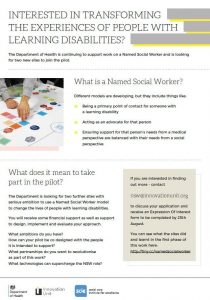Last year's pilot scheme prepares to roll out further. Deadline for expressions of interest is 25 August 2017!
 Earlier this year, I wrote a blog applauding the early success of an initiative in which people with learning disabilities, mental health challenges and autism were assigned a Named Social Worker – someone who could advocate and coordinate their care and support in a more holistic and person-centred way.
Earlier this year, I wrote a blog applauding the early success of an initiative in which people with learning disabilities, mental health challenges and autism were assigned a Named Social Worker – someone who could advocate and coordinate their care and support in a more holistic and person-centred way.
The idea is so simple, it’s hard to believe we hadn't thought of it before. Last year, the Department of Health, in partnership with the Social Care Institute for Excellence (SCIE) and the Innovation Unit, agreed to fund six pilot schemes in local authorities across the country. We wanted to personalise what too often can be experienced as a procedural service, give individuals and their families a voice, and someone specific they knew they could talk to.
These initial trials provoked a lot of positive discussion, and I know that much has already been learned – not just by social workers but also colleagues in other services with whom they engage. Take a couple of examples:
Sheffield’s priority was clearly defined: they wanted to build a joined-up, integrated experience to replace the areas previously scattered provision. The role of the named social worker was largely focused on building relationships with service providers, alongside the individual and their family.
In Hertfordshire, they focused on offering multidisciplinary, flexible social work, and on carefully managing outcomes in the long term. The named social worker was able to offer continuity, and better-informed evaluation developed as the relationships involved improved.
I hope these examples demonstrate how this project can be adapted to work anywhere, and how plain the benefits can be. The three major take aways for me are that a Named Social Worker can:
- Be a continuous, trusted, primary point of contact
- Act as an effective advocate, able to build informed, longstanding relationships between parties
- Ensure support for that person’s needs from a medical perspective are individually balanced with their needs from a social perspective
I’m delighted to say the Department of Health is now looking for two new pilot sites to join the scheme, and I would keenly encourage applications. Financial support is available, as well as support to design, implement and evaluate your approach.
The deadline is 25 August 2017, which is not that far away, so please don't miss out!
I’d love to see these new sites broaden the scope of the scheme, so ambition is vital. I’d like these new sites, once chosen, to think about co-designing care with the people it is intended to support, what partnerships they want to revolutionise as part of this scheme, and what technologies could be used to supercharge social work in their communities.
This is a fantastic opportunity to make simple changes with huge impact. I'm very proud of the progress we’ve made so far, and I can't wait to see where we go next.
2 comments
Comment by Philippa Jones posted on
This idea mirrors the innovative approach we at Bromford have taken in our social housing management. We've replaced traditional housing managers and a range of specialist service inputs with a Neighbourhood Coach who has a much smaller patch and owns the whole relationship with those customers. We've learnt a lot from ABCD approaches, focussing on the strengths and talents of our customers and connecting them better with each other and their local communities. Would be great to share thinking sometime?
https://www.bromford.co.uk/get-to-know-us/what-we-do/the-right-relationship/our-coaching-approach/
Comment by Roseann Connolly posted on
I hope that these approaches will be rolled out. I hope that there will be resources and training provided to support this culture shift - this sea change! Getting people out of buildings (valuable real estate?) and 'into the community' could be positive if done right and resourced.
Is the Community primed to accept learning disabled, people with mental health issues, autistic people?
Are people with additional needs supported to access generic services?
Are social workers and support workers being prepared for the sea-change?
I guess some places they are and others they aren't.
It would be helpful if summaries of the evaluations of these projects could be tailor made for local service user and carers groups. Could we have a set of questions that would be be useful to prompt 'frequently asked questions' locally? In fact a set of FAQs that local authorities could ask themselves that would be accessible both to local authority officers and local authority councillors who often seem to be as much at sea as local residents.
The people who will pay the price if there are 'gaps' if the right questions are not considered when rolling these plans out locally will be service users and carers.
But keeping to the positive these pilots, projects and initiatives are very welcome.